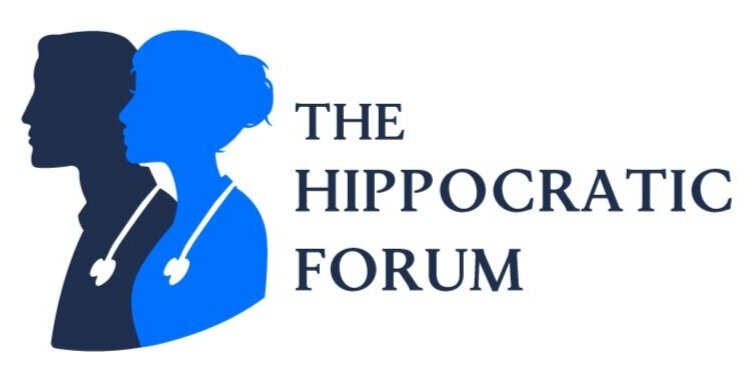The Horizontal Virtues
In virtue ethics, there is always a connection between the goal (telos) we are pursuing and the habits (virtues) needed to get us there, and these habits are always formed in community.
Yet we often have our habits formed without considering the telos or the community they imply. If medical training is a site of habit and virtue formation, what virtues does it form and what vision of the ‘good life’ will such virtues orient us to pursue? What kind of community are we creating?
Ethics, as Alasdair MacIntyre rightly insists, presupposes “above all some account of the human telos.” For Aristotle, that telos is eudaimonia, roughly translated as ‘flourishing.’
But in Aristotle’s world the fullness of eudaimonia seems to be available only to the ‘haves’ of society—free men with “riches and political power … good birth, good children, and beauty.” It takes place in a homogenous political community which constitutively excludes the ‘foreigner.’ This is certainly one vision of human flourishing, but it is a package we must reject. We need an alternative account of human flourishing for contemporary medical training.
For example, in 2018 I participated in a course in Haiti called “Beyond the Biological Basis of Disease.” Organized by EqualHealth, the course gave me a brief but intense taste of the fight for the “good life” for all —and the role of the health professions in it—that I had never experienced in medical school, nor in the ‘white savior’ mission trips I had gone on with my childhood church.
In the EqualHealth course, international and Haitian participants from a range of health professional backgrounds were paired off as roommates. Inside of an intentional and horizontal “culture of encounter,” each gave what they could offer, and the pairs quickly became friends. My own roommate in Haiti, Jonas, was a public health student who had finished medical school in Mexico after the 2010 Port-au-Prince earthquake destroyed his medical school in Haiti. Today, we remain collaborators and friends, even planning to again be roommates after his upcoming move to Minnesota for further medical training.
In our course, the international participants’ fees funded the program, while Haitian students served as local hosts and experts both medically and linguistically (the course was in French). We heard lectures and visited sites that connected structural violence—much of it from (neo)colonial French and American powers—with what Haitians call “stupid deaths,” those “completely preventable with the tools already available to the fortunate few.”
Even though the course was secular, we were energized by what I came to see as the good life in pursuit of shalom, rather than Aristotle’s eudaimonia. Shalom is that thick and verdant vision of interconnected justice and flourishing beyond all oppression and scarcity. Shalom is when we are in right-relation with Creator, neighbor, self, and creation. It is marked by “joy, well-being, harmony, and prosperity,” as well as by its concern for the most vulnerable.
If Aristotle’s aristocratic eudaimonia requires ‘vertical’ virtues, we learned instead of ‘horizontal’ virtues oriented towards the telos of shalom. To name a few, these ‘horizontal virtues’ are solidarity, friendship, interdependence, self-reflection, dancing, generosity, honoring one another and the earth, making a preferential option for the poor, analyzing the structural and historical causes of suffering and death, and even “militantisme” (organizing and activism). These are what theologian Vincent Lloyd calls the “virtues against domination” which grapple with a world “choke-full of systems of domination.”
Medical training too often reinforces what theologian Willie Jennings calls the “virtues of possession, control, and mastery”—vertical virtues aimed towards an imperial telos of “self-sufficient white masculinity.” Just as Aristotle’s virtue theory was too male and aristocratic, today’s is too White, too complacent, and too success-oriented.[1]
As a medical trainee, I sense this is the warped framework of virtues which is unofficially taught in today’s medical spaces (often with a heavy hand). In fact, just like contemporary medical ethics, the public, official face of Aristotelian virtue ethics is unobjectionable. Inspecting Aristotle’s list of admirable virtues doesn’t reveal the problem, because all of his virtues are, well, admirable. It is rather the telos we must examine, as well as the list of hidden, unadmirable, and unofficial virtues which that telos requires.
To avoid reifying unjust social structures, today’s virtue theorists might listen to the testimonies of our Haitian brothers and sisters. They might retrieve patristic sources like Gregory of Nazianzus who reminds us that “of all the virtues … the best is ‘love of the poor’” (philoptochias). Medical ethicists might learn from contemporary Womanist virtue ethics which centers around the voices of Black women and others from the margins.
I hope that future medical professional formation not only instructs us in virtues such as “fidelity to trust” and “fortitude,”[2] but also forms us for countercultural actions like responding publicly when our patients cannot afford their insulin or ARTs, combatting the sources of contemporary ‘deaths of despair,’ fighting for human rights, or communally choosing lives of accompaniment and service among the poorest and most vulnerable. In this way, medical formation can move beyond the vertical virtues of the elite, and cultivate instead the horizontal virtues which are oriented towards the shalom required for our patients’ health to truly flourish.
Warm thanks to Dr. Farr Curlin for his insightful feedback and his passion for the virtues in medical formation. Thank you as well to Michelle Morse and the EqualHealth team for their education in virtue and thirst for justice.
References:[1] See Therese Lysaught and Cory Mitchell’s talk “Vicious Trauma: Poverty, Race, Bodies and the Confounding of Virtue Ethics” at the 2021 Society for Christian Ethics, and as a forthcoming article.
[2] These are mentioned, inter alia, in The Virtues in Medical Practice by Edmund D. Pelegrino and David C. Thomasma.
Painting: The Sick Woman by Jan Steen
